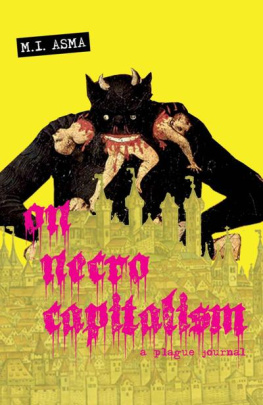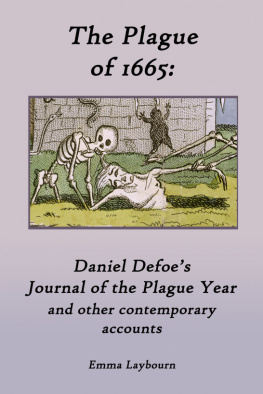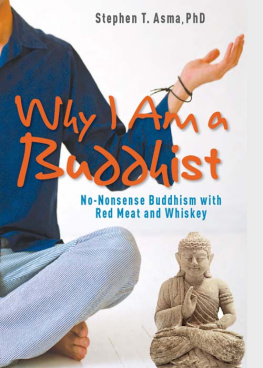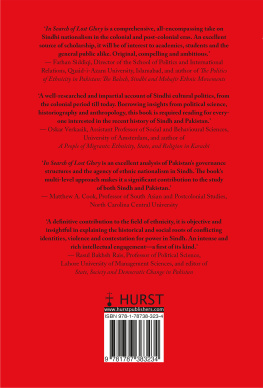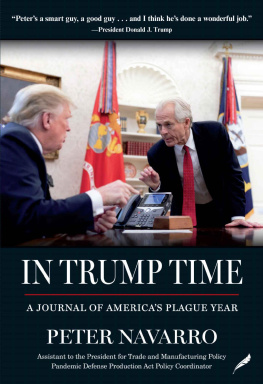M.I. Asma - On Necrocapitalism: A Plague Journal
Here you can read online M.I. Asma - On Necrocapitalism: A Plague Journal full text of the book (entire story) in english for free. Download pdf and epub, get meaning, cover and reviews about this ebook. year: 2022, publisher: Kersplebedeb Publishing, genre: Politics. Description of the work, (preface) as well as reviews are available. Best literature library LitArk.com created for fans of good reading and offers a wide selection of genres:
Romance novel
Science fiction
Adventure
Detective
Science
History
Home and family
Prose
Art
Politics
Computer
Non-fiction
Religion
Business
Children
Humor
Choose a favorite category and find really read worthwhile books. Enjoy immersion in the world of imagination, feel the emotions of the characters or learn something new for yourself, make an fascinating discovery.
- Book:On Necrocapitalism: A Plague Journal
- Author:
- Publisher:Kersplebedeb Publishing
- Genre:
- Year:2022
- Rating:4 / 5
- Favourites:Add to favourites
- Your mark:
- 80
- 1
- 2
- 3
- 4
- 5
On Necrocapitalism: A Plague Journal: summary, description and annotation
We offer to read an annotation, description, summary or preface (depends on what the author of the book "On Necrocapitalism: A Plague Journal" wrote himself). If you haven't found the necessary information about the book — write in the comments, we will try to find it.
On Necrocapitalism: A Plague Journal — read online for free the complete book (whole text) full work
Below is the text of the book, divided by pages. System saving the place of the last page read, allows you to conveniently read the book "On Necrocapitalism: A Plague Journal" online for free, without having to search again every time where you left off. Put a bookmark, and you can go to the page where you finished reading at any time.
Font size:
Interval:
Bookmark:
On Necrocapitalism: a plague journal
by M.I. Asma (J. Moufawad-Paul, Devin Zane Shaw, Mateo Andante, Johannah May Black, Alyson Escalante, D.W. Fairlane)
ISBN 978-1-989701-15-7
Published in 2021 by Kersplebedeb
This edition Kersplebedeb
All rights reserved
To order copies of the book:
Kersplebedeb
CP 63560, CCCP Van Horne
Montreal, Quebec
Canada
H3W 3H8
www.kersplebedeb.com
www.leftwingbooks.net
PREFACE
The present volume collects, with some revisions, the entries from the blog On Necrocapitalism, written by M.I. Asma, the collective designation for six authors representing a variety of revolutionary anticapitalist theoretical persuasions: J. Moufawad-Paul, Devin Zane Shaw, Mateo Andante, Johannah May Black, Alyson Escalante, and D.W. Fairlane.
We set out to produce a serial theoretical-philosophical project focused on class struggle in the midst of the covid -19 pandemic. We wrote up a prologue, and then the rest followed a process like that of a collaborative chain novelthough, of course, we could not know where events would take us. One of us would write an entry, and the next contributor would be entirely free to take the discussion in whichever direction they saw fit.
The results, we believe, present a cohesive perspective. Nonetheless, some challenges arose while collecting the entries in book form. We have aimed to preserve what we consider one of the unique aspects of this plague journalits provisional and contemporary attempt to provide class analysis and philosophical criticism to events as they unfolded. Nonetheless, in some cases we have revised the tense of some passages, since the events they discuss have now moved from the future to the past (the most notable instances concern conjectures about the impacts of the us presidential elections on broader social struggles). We have also updated or deleted obsolete information where it does not affect the analyses. Despite these changes, we believe that our observations, as they developed sometimes even week-to-week, present a valuable, critical record of one year of the pandemic.
EPIGRAM
Let us not, however, flatter ourselves overmuch on account of our human conquest over nature. For each such conquest takes its revenge on us. Friedrich Engels
The crisis consists precisely in the fact that the old is dying and the new cannot be born, in this interregnum a great variety of morbid symptoms appear. Antonio Gramsci
P R OLOGUE
A virus is haunting the globe, one of pandemic proportions, whose threat has necessitated unprecedented measures to forestall death and violence worse than the present crisis. But the cruelty, violence, and depredations that have accompanied the covid -19 pandemic arent merely detritus in the wake of its spread; they characterize the necrocapitalism of this conjuncture.
From its beginning to its current senile form, capitalism has presided over a massive graveyard. The slavery and genocide that marked its bloody emergence, the workhouses filled with bodies laboring to death and streets glutted with the starving poor, these have persisted through the present, combining with exterminatory wars and environmental devastation. And then, beyond that, two world wars: the first a squabble between imperialist nations, which forced their poor to fight in trenches for the interests of the rich; the second caused by the most reactionary form capitalism can take, fascism. There have been many others since then, all waged upon the oppressed nations in the global periphery in the interest of capitalist hegemony and accumulation. Half of Korea burned to the ground; Vietnam was invaded and brutalized in an attempt to prevent its national self-determination; multiple overt and covert wars, too many to detail here, where regimes were overthrown, dictators friendly to capitalism installed, and all resistance murdered and disappearedassassinated, mass-murdered, hunted down like dogs, starved and tortured, thrown out of helicopters, and written out of official history; for others among the colonized and dispossessed, some combination of apartheid, forced assimilation, death squads, famine, and disease were and are a direct result of both military and economic intervention. Meanwhile, the prisons in the most powerful capitalist countries have grown to absurd proportions. It is entirely laughable to call a nation-state such as the us the land of the free when it houses 22 percent of the worlds prisoners; it is absurd to call the Global North the home of democratic values when its prisons disproportionately house Black, brown, and Indigenous peoples targeted by wars on drugs, terror, or the poorand this before we even factor in the bloody legislation that enables the dehumanization and detention of the migrant proletariat. Indeed, the identification of the us (and other such nation-states) with freedom was always ludicrous, considering that its legacy of colonialism and slavery has meant that it has been a prison house of nations since its inception.
This bloody and ongoing legacy is not an aberration of capitalism; it is not proof that capitalism is broken, but, rather, it is evidence that it is functioning very well. Capitalisms core logic, which in laypersons terms is simply about making the rich richer at the expense of the labor of the poor, always points towards what Robert Biel has termed exterminism; the politics it eventually generates is like what Achille Mbembe has called necropolitics. Or maybe Sayek Valencias notion of gore capitalism is an apt description. Mark Stevens Splatter Capital analyzed capitalism according to violent horror films and adequately summed up the exterminist necropolitics of this system: capitalism is both literally and figuratively the protracted splattering of human bodies.
Which is why all of the depredations and violence revealed by the covid -19 pandemic, all of the contradictions of capitalism laid bare, should not be surprising. Corona is a black light, comedian Megan Amram tweeted, and America is a cum-stained hotel room. But not just Americathough as the most powerful capitalist country with the least level of social welfare it best represents this analogybecause every capitalist states necrotic underbelly is being exposed. Subsidies for the corporations and banks and paltry welfare cheques for only some of the poor hit hard by the crisis; entire populations exposed to death and disease; refugees and immigrants subjected to harsher deportation measures. Quarantine laws subordinated to capitalist logic. New security measures, the preface for possible states of emergency continuing after the crisis has run its course, are brought into being: pigs now patrol every street and in larger numbers, like they were in a Mad Max movieor, more appropriately, like filibusters and scalp-hunters policing colonial frontiers; the settler garrison manifesting on every block. And when the pandemic ends it is reasonable to expect, in these various capitalist nation-states, that the new austerity and security measures will remain, that the poor and marginalized will be expected to pay for the crisis for years to come, while the people on top will continue to get rich. And this is to say nothing of the global peripheries, which will bear the larger death toll of the crisis, which may not even be given the vaccine if and when it arrives because they cannot afford to buy it from the biomedical corporations that will surely patent the cure when it is discoveredjust as they cannot afford already existing vaccines for other diseases, which result in yearly pandemics that could be easily cured.
We are living in a necrocapitalism that has always been necrotic but is again wallowing in its exterminism. Or, more accurately, this wallowing is being exposed at the very heart of its civilization. The question is how many of us will accept this exposure, laugh it off, and keep living right through it because its nightmare has become normative. Already, in the midst of the pandemic, some leftists are singing the praises of the government when it enacts emergency measures, acting as if some version of a responsive state, as opposed to the laissez-faire restrained state (to use Martha Finemans terms), is evidence of socialism. It is rather shocking to witness activists who once militated against closed borders, who advocated for migrant and refugee justice, laud their governments for border closuresclosures that most immediately affected migrants and refugeesin the interest of community safety. What will we be primed to accept as the new normal when this emergency has run its course? And what factions of the broad left will be lured into a post-pandemic patriotism that, dressing up reactionary notions in progressive looking costumes, will focus on rebuilding national unity while accepting that some populations deserve to live and thrive more than others? All crises, as Lenin once wrote, make manifest what has been hidden; they cast aside all that is relative, superficial, and trivial; they sweep away the political litter. And this crisis not only revealed the hidden contradictions of capitalism; it also revealed the contradictions in the left itselfcontradictions that will take on new life in the post-pandemic reality.
Next pageFont size:
Interval:
Bookmark:
Similar books «On Necrocapitalism: A Plague Journal»
Look at similar books to On Necrocapitalism: A Plague Journal. We have selected literature similar in name and meaning in the hope of providing readers with more options to find new, interesting, not yet read works.
Discussion, reviews of the book On Necrocapitalism: A Plague Journal and just readers' own opinions. Leave your comments, write what you think about the work, its meaning or the main characters. Specify what exactly you liked and what you didn't like, and why you think so.

